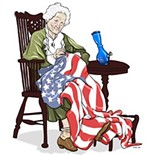Roberts Goes Noir
SCOTUS Chief Justice John Roberts tries his hand at writin' the pulp way.
By Jordan Smith, 4:34PM, Wed. Oct. 15, 2008

It isn't often that the justices of the U.S. Supreme Court actually take pen to paper to formally log their dissent when colleagues decide not to hear a case. But on Oct. 14, Chief Justice John Roberts made an exception to the rule -- with an attempt at Raymond Chandler-style pulp. Check it: "North Philly, May 4, 2001. Officer Sean Devlin, Narcotics Strike Force, was working the morning shift. Undercover surveillance. The neighborhood? Tough as a three-dollar steak," Roberts wrote.
The case: An appeal from Pennsylvania, where the state Supremes tossed the conviction of a man arrested for drug possession. The court ruled that the cops, who'd witnessed an exchange of "small objects" between two men on a street corner, lacked probable cause to arrest one of the men. The state turned to the U.S. Supremes, but the court rejected the appeal. Roberts (and Justice Anthony Kennedy) disagreed, arguing that while a "drug purchase was not the only possible explanation for the defendant's conduct" it was "certainly likely enough to give rise to probable cause."
You can read the rest of Roberts' dissent in Pennsylvania v. Dunlap here.
Got something to say on the subject? Send a letter to the editor.
A note to readers: Bold and uncensored, The Austin Chronicle has been Austin’s independent news source for over 40 years, expressing the community’s political and environmental concerns and supporting its active cultural scene. Now more than ever, we need your support to continue supplying Austin with independent, free press. If real news is important to you, please consider making a donation of $5, $10 or whatever you can afford, to help keep our journalism on stands.
Jordan Smith, May 9, 2013
May 22, 2014
Drugs, U.S. Supreme Court, John Roberts










